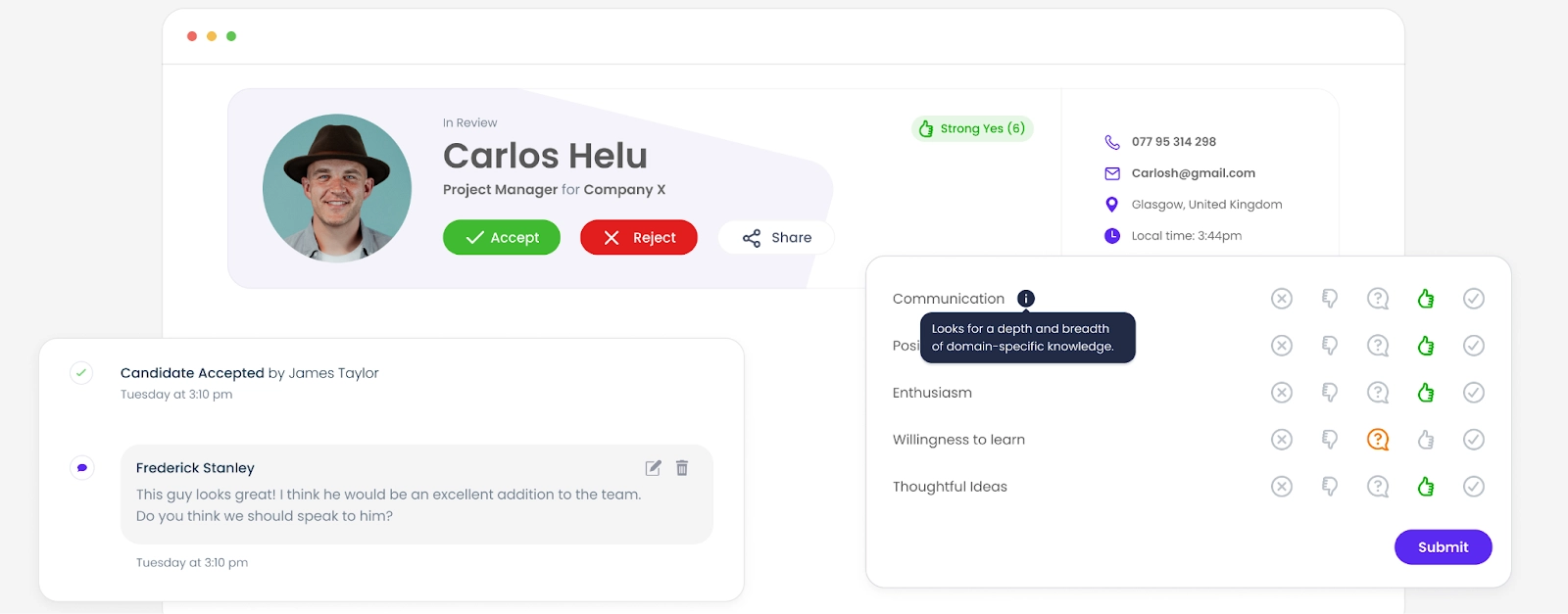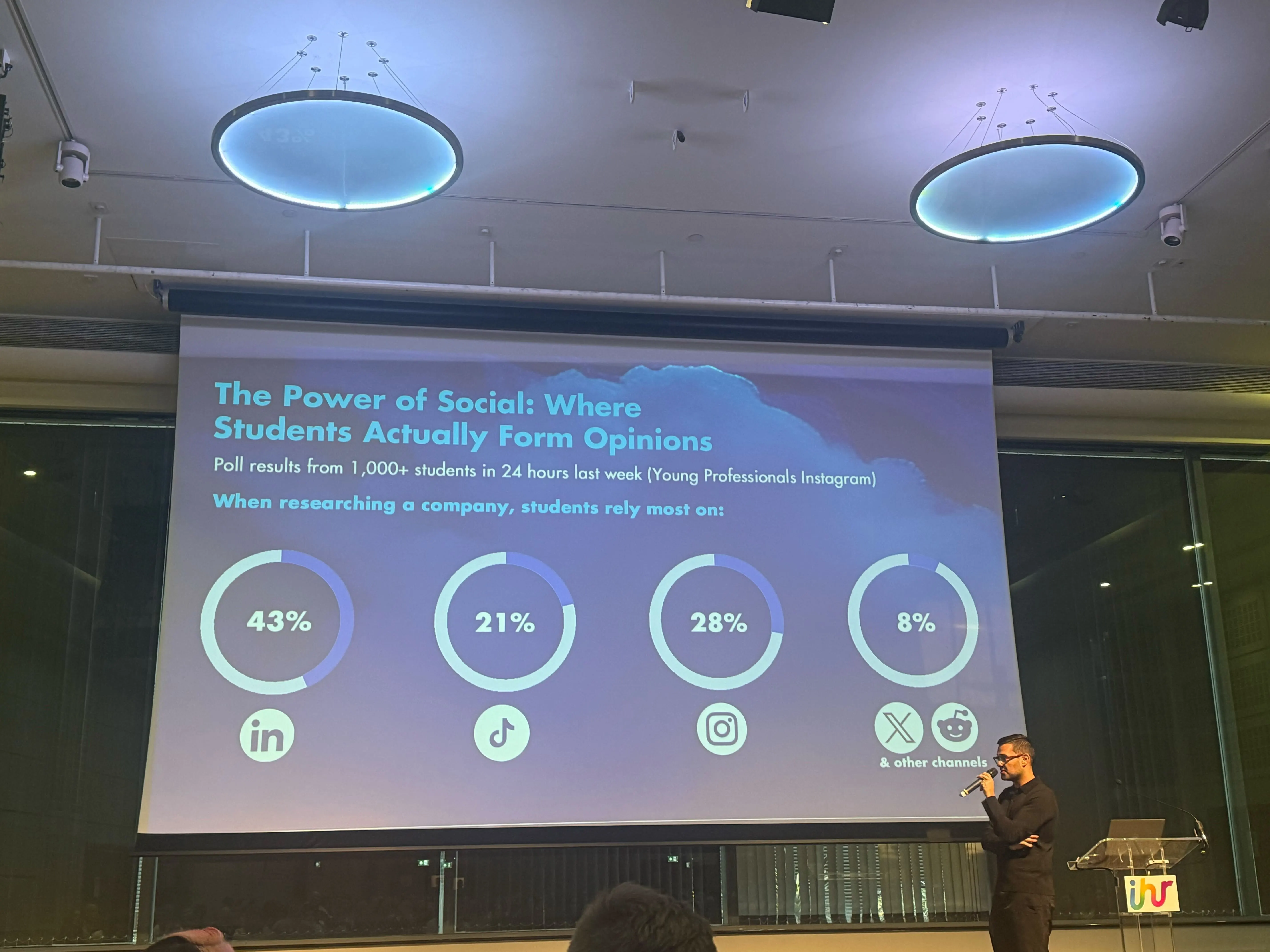Between 85% and 97% of hiring managers still rely on gut instinct when deciding which candidates to advance. But relying on gut instinct has significant drawbacks.
Not only can unconscious bias influence decisions, but it can also lead to legal risks and damage your employer's brand.
Scorecards are a great way to bring objectivity into the mix. They let you evaluate all candidates using the same criteria, ensuring the best fit makes it to the next stage.
In this Willo article, we’ll walk you through different scorecard templates to help you assess candidates fairly (and even show you how to create your own).
- Skills-based hiring scorecard
- Cultural-fit scorecard
- Leadership potential scorecard
- Adaptability scorecard
- Remote work suitability scorecard
- Client-facing skills scorecard
- Innovation and creativity scorecard
- Technical proficiency scorecard
- Cross-functional collaboration scorecard
- Emotional intelligence scorecard
- Problem-solving scorecard
- Time management scorecard
- Initiative scorecard
- Presentation and communication scorecard
- Project management skills scorecard
- Diversity and inclusion advocacy scorecard
What Is an Interview Scorecard?
An interview scorecard is a structured evaluation tool that measures candidates against specific job criteria. It defines the essential skills, qualifications, and traits for a role and then provides a framework to score each candidate consistently. This transforms subjective impressions into measurable assessments.
To maximize scorecard effectiveness, pair them with well-crafted top video interview questions for recruiters and hiring managers that directly target your evaluation criteria.
They typically look something like a grading rubric.

On the left, you have the criteria being evaluated—key skills, competencies, and qualifications essential for the role. Think "project management experience," "client communication skills," or anything else that’s relevant to the role.
On the right, there's space for the interviewer's rating. During the interview (or review session if you opt for async interviews), the interviewer assesses how well the candidate demonstrates each criterion and assigns a rating based on a predefined scale.
Speaking of scales and scoring…
What makes a good structured interview scorecard
A good structured interview scorecard must have a clear scoring methodology, a layout that enables consistent application of the method, and be easy to integrate across the hiring process. Without these three layers working together, the results won’t be reliable.
A clear candidate scoring methodology
The interview scoring methodology (how you assign, define, and use scores) is central to whether a structured interview is successful. Many suggest the classic Likert scale (ratings on a scale of 1 to 5). However, this leaves a lot of room for interpretation. For example, what does a perfect 5 out of 5 score for B2B sales experience actually look like? It’s very hard to standardize this kind of system.
A well-designed interview scorecard structure
A well-designed scorecard structure is one where the rows, columns, and sections flow logically. It contains competencies to be measured, a clear scale to measure them, space for evidence, and a final area to capture the hiring decision.
In practice, people sometimes use “scorecard,” “matrix,” and even “rubric” interchangeably — but technically, the scorecard can hold both the matrix and rubric together.
Think of the interview scorecard as the container for your organization’s scoring system. Inside that container, you can have:
- Rating scale: A Likert rating scale, a Yes/No binary scoring, or even a qualitative “good/bad” rating.
- Rubric: the definition of what each score means for each competency.
- Matrix: the structured table where competencies are listed against the rating scale.
- Comment boxes: to capture qualitative reasoning behind the scores.
- Weighting/Scoring Summary (optional): A final column/row with weighted totals to show overall results.
That way, the interviewer has everything they need to objectively score a candidate in one place.

Easy integration across the hiring process
A great interview scorecard should fit naturally into how the hiring team works. Depending on how your hiring process works, the interview scorecard should:
- Be shareable and accessible: Interviewers should be able to access it easily (digital format, ATS integration, or collaborative doc).
- Supports collaborative feedback: There should be space for both structured scores and narrative comments. Some collaborative scorecards allow multiple interviewers to contribute their feedback independently, reducing groupthink before the hiring debrief.
- Be consistent across roles & stages: That includes having a standardized design that makes it easy for recruiters, hiring managers, and interviewers to apply without retraining for every role.
- Enable easy candidate comparison: It should provide a clear scoring summary to prevent reliance on gut feelings in the final decisions. Also, the scorecard template should make it easy to aggregate & export results into a matrix for side-by-side evaluation.
Now that we understand what makes a great candidate scorecard, it's pretty easy to see why interview scorecard sheets are not reliable.
Why Are Interview Scorecards Important?
Maintains consistency across evaluations
Using the same criteria to rate every candidate keeps your hiring process fair and focused. Rather than relying on gut reactions, interviewers have a focused, structured evaluation process to follow that leads to more fair (and often better) decisions.
This is especially helpful for multi-interviewer setups. If you have a hiring panel or multiple interview rounds, scorecards keep everything consistent.
Enhances compliance and reduces legal risks
Scorecards create a clear paper trail showing that every candidate was evaluated on job-specific criteria, not personal judgment. This documentation protects your company if hiring decisions are questioned, demonstrating a fair, structured process that reduces legal risk and protects your reputation.
Drives better candidate feedback
The detailed notes from scorecards are invaluable when giving candidates feedback after interviews.
Since 94% of candidates want post-interview feedback, having structured documentation helps you provide specific, meaningful responses about their performance. This level of detail creates a better candidate experience, even for those who don't get the job.
16 Interview Scorecards Templates For Objective Hiring
We’re big fans of skills-based hiring here at Willo.
Switching to a skills-based hiring approach leads to better hiring outcomes, reduces bias, and increases your talent pool by 10X on average. Take your skills-first approach further with our CV-free design template to focus purely on candidate capabilities rather than traditional credentials.

This foundational scorecard evaluates candidates on the exact skills they need to excel in the role. Consider implementing great pre-recorded video interview questions for effective candidate screening to gather consistent skill-based responses that align with your scorecard criteria.
While you can create specialized scorecards for specific skills (which we'll cover later in this post), this template provides a comprehensive assessment of all essential competencies.

Building teams that work well together starts with finding people who align with your company's values. This scorecard measures how candidates' working styles, behaviors, and values match your company culture, helping you identify those who will both contribute to and thrive in your environment.
Identifying future leaders requires looking beyond current skills to spot longer-term potential.

This scorecard evaluates candidates' decision-making abilities, strategic thinking, and people management capabilities. It helps you assess whether they have the right mix of vision, experience, and interpersonal skills to step into leadership roles and grow with your organization.
Adaptability is crucial for roles in fast-moving environments like tech startups or high-growth industries.

This scorecard assesses a candidate’s ability to handle change, quickly learn new skills, and thrive in dynamic situations. It’s ideal for roles that demand flexibility and resilience, helping you find candidates who excel in unpredictable or high-paced settings.
This scorecard evaluates the key traits needed for remote success, like self-discipline, virtual communication skills, and independent problem-solving ability. For comprehensive remote hiring, explore asynchronous video interview platforms to streamline hiring and conduct thorough remote assessments.
As we learned while conducting research for our Embracing Flexibility Report, even high-performers in traditional offices may struggle to stay productive and engaged in remote environments. Getting remote hiring wrong impacts productivity and team dynamics, and it can lead to costly turnover.

This scorecard evaluates the key traits needed for remote success, like self-discipline, virtual communication skills, and independent problem-solving ability. It helps you identify candidates who will thrive in remote roles while flagging potential challenges before they impact your team.
Strong client relationships can make or break your business—evaluating these skills early is crucial.

This scorecard assesses candidates' ability to build rapport, communicate effectively, and maintain professionalism under pressure. It's particularly valuable for roles in sales, account management, or customer service where employees directly represent your company to clients.

You'll love this template if you’re hiring for creative or R&D roles. It’s designed to assess a candidate’s ability to think outside the box and solve problems creatively—essential skills for positions where developing new ideas is a big part of the job.

The technical proficiency scorecard zeroes in on the candidate’s specific technical skills and expertise, making it perfect for specialized roles like software engineering, IT support, or technical consulting. Put simply, it’s to help you verify the practical knowledge and hands-on abilities required in these fields.

The majority (72%) of employees perform better in a collaborative environment. Plus, business leaders often see a 30%+ boost in productivity when they prioritize collaboration. It’s a nice skill to test for all roles, but it’s particularly non-debatable for roles like project managers, coordinators, and leadership positions where collaboration is essential.
Emotional intelligence is responsible for 58% of job success. In fact, 71% of business leaders value it more than technical skills when evaluating candidates.
Emotional intelligence (EQ) is particularly crucial for roles that involve team management, navigating tricky interpersonal situations, or handling high-pressure environments.

This scorecard assesses a candidate’s ability to manage emotions and understand and influence others. It’s ideal for management, client-facing, and leadership roles where communication and empathy are essential.

Everyone says they’re a great problem solver, but how do you know for sure? This scorecard template gives you a clear, structured way to really assess each candidate’s problem-solving skills. It breaks down this big skill into specific, measurable areas—like quick decision-making, thinking on their feet, and more—so you can spot who’s truly up for the challenge.

Time is the one thing we can’t get back, so every employee needs to know how to make the most of it. This is especially important for roles where juggling tasks, meeting deadlines, or managing projects is the norm—like admin roles, project managers, and similar positions.
Use this scorecard to evaluate a candidate’s ability to manage time, prioritize tasks, and stay organized.

Initiative is a key trait for candidates in roles that need independence or leadership potential, so it deserves its own scorecard. This one evaluates a candidate’s ability to take proactive actions, suggest improvements, and drive projects forward without needing constant supervision.

Some roles require more public speaking, pitching, and presenting than others—think sales positions. If you’re hiring for one of these, you need to ensure candidates have strong communication (both verbal and nonverbal) and presentation skills. This scorecard helps you gauge if they’ve got what it takes.

We’ve talked a lot about project management as a skill, but it’s actually made up of several key parts—that’s where this scorecard comes in. The criteria in this template will help you assess skills like planning, execution, and resource management. It’s perfect for hiring project managers or team leads who’ll be taking on complex projects.

This scorecard assesses candidates’ understanding and commitment to these values, especially for leadership or D&I-focused roles. It evaluates their experience with D&I initiatives and how they plan to promote and integrate these values within a team.
Why spreadsheet-based interview scorecards limit objective scoring
Spreadsheets or Excel sheets are a practical way to manage interview scorecards. They’re easy to set up, flexible, and most hiring teams already use them. But when measured against what makes a great scorecard, they quickly fall short:
- Weak scoring methodology: Because spreadsheet scorecards rely on bare numeric or yes/no inputs, they lack rubrics or behavioral anchors. This forces interviewers to define scores on their own, which inevitably leads to inconsistent evaluations.
- Poor structure for capturing evidence: While spreadsheets handle numbers well, they’re poor at capturing qualitative insights. Comment fields are cramped and unstructured, which makes it difficult to tie observations directly to the competencies being scored. As a result, valuable context often gets lost.
- Limited integration and collaboration: Sharing and editing spreadsheets is slow and error-prone. Multiple interviewers can’t contribute simultaneously without version-control issues, and side-by-side candidate comparisons require manual workarounds like filters or pivot tables.
- Lack of process consistency: Even with a template, different interviewers may add, delete, or format sections differently. Over time, this lack of consistency undermines fairness and makes aggregate results unreliable.
- Scalability issues: Managing sheets across dozens or hundreds of candidates quickly becomes unwieldy. Errors in formulas or accidental edits can compromise the integrity of the scoring system.
Streamline Your Recruitment Process with Scorecards
Interview scorecards transform subjective hiring into data-driven decisions. They help you evaluate candidates consistently and fairly while protecting your company from bias and legal risks. While these templates offer a strong foundation, the best scorecard is one you create for your specific needs.
That's where Willo comes in.
Our platform goes beyond custom scorecards. With Willo, you can conduct async video interviews that scale your hiring process while delivering an outstanding candidate experience. Discover comprehensive solutions including asynchronous video interview platforms and effective interview questions to create a complete objective hiring system.
Book a free demo today.
.png)


